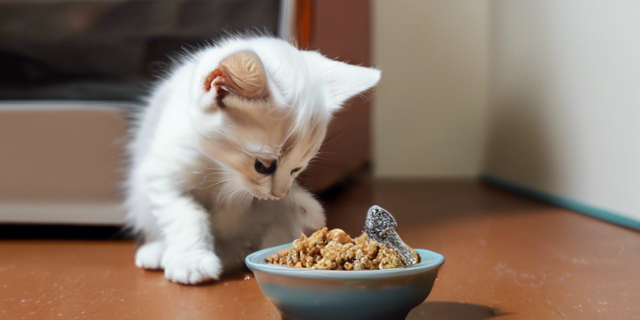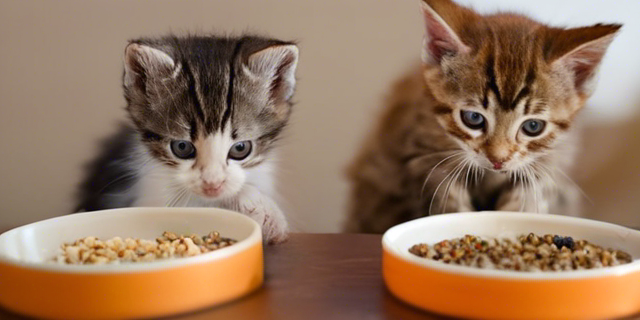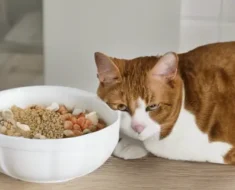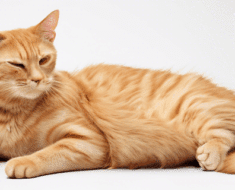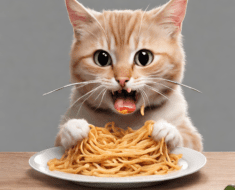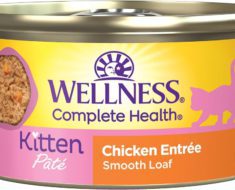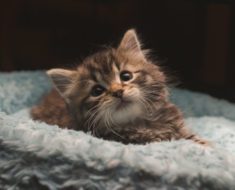Eating older cat’s food can cause digestive issues for kittens. Monitor for symptoms and visit a vet if concerned.
If you have a kitten and an older cat and if your cat eats older cat food, you may have noticed them eating each other’s food. It’s common for them to be curious about each other’s meals. However, if your kitten consumes the older cat’s food regularly, it could lead to potential health issues.
We’ll discuss what happens if your kitten eats your older cat’s food, the potential risks involved, and what steps you should take to ensure your kitten’s well-being. Understanding the implications can help you take the necessary precautions to keep both your kitten and older cat healthy and content.
Effects On The Kitten
If your kitten eats your older cat’s food, it could lead to digestive issues and malnutrition. The older cat’s food may contain higher levels of certain nutrients that can be harmful to a developing kitten. It’s important to keep the kitten’s diet balanced and appropriate for their age to ensure their optimal health.
| Effects on the Kitten |
| Digestive Upset |
| Kittens might experience digestive upset if they eat food meant for older cats. |
| Nutritional Imbalance |
| Consuming older cat’s food can lead to a nutritional imbalance in kittens. |
Impacts On The Older Cat
When your kitten eats your older cat’s food, it can lead to potential weight gain for the older cat. The food formulated for kittens is often higher in calories and fat to support their growth and development, which can be excessive for an adult cat. This overconsumption of high-calorie kitten food can increase the older cat’s weight, leading to potential health issues such as obesity and joint problems.
Additionally, the older cat may experience nutrient deficiency if the kitten consistently consumes its food. Adult cats have different nutritional needs compared to kittens, and the food designed for kittens may not provide the necessary nutrients in the right proportions for the older cat’s health. This can lead to deficiencies in essential vitamins and minerals, impacting the overall well-being of the older cat.
“Behavioral” Changes
When a kitten eats an older cat’s food, it can lead to behavioral changes such as aggression and food guarding. Kittens might become aggressive towards the older cat, trying to establish dominance over the food. Similarly, they may exhibit food-guarding behavior, protecting the food and showing aggression towards anyone who approaches.
This kind of behavior is instinctual, as cats are territorial and can be possessive of their resources. To prevent these issues, it is important to feed kittens separate from the older cat, in a different area. This ensures each cat has access to their food without feeling threatened or needing to protect it.
Additionally, it’s essential to provide enough resources for both cats, including separate food dishes and feeding areas, as well as plenty of water, toys, and attention. This helps to reduce competition and provide a harmonious environment for both cats, preventing any behavioral changes caused by food rivalry.
If the Kitten eats the older Cat’s Food? Health Risks
When your kitten eats your older cat’s food, it can pose some health risks. One concern is the potential for allergies. Cats can develop allergies to certain ingredients in their food, and if your kitten consumes the older cat’s food, they may be exposed to these allergens, which can lead to symptoms like itching, sneezing, or gastrointestinal upset.
Another concern is gastrointestinal issues. The older cat’s food may be formulated differently to meet their specific dietary needs, and consuming it can disrupt your kitten’s digestive system. This can result in diarrhea, vomiting, or abdominal discomfort.
It’s important to keep your kitten’s and older cat’s food separated to prevent these health risks. Feed them in separate areas and at different times to ensure that each cat receives their appropriate nutrition.
Consulting with your veterinarian can help you determine the best diet for both your kitten and older cat, ensuring their individual needs are met and reducing the risk of any potential health issues.
Frequently Asked Questions Of What Happens If My Kitten Eats My Older Cat Food
Is It Bad If My Kitten Eats My Older Cat Food?
It’s not ideal for a kitten to eat older cat’s food regularly as their nutritional needs differ.
Will My Kitten Get Sick From Eating Cat Food?
Kittens may get sick from eating cat food if not formulated for growth stages.
Can Kittens Eat Food For Senior Cats?
Yes, kittens can eat food for senior cats as long as it meets their nutritional needs. Always consult with your veterinarian for the best diet for your kitten’s health.
How I Stop Kittens from Eating Older Cat Food?
To stop your kitten from eating your older cat’s food: 1. Feed them separately to avoid competition. 2. Restrict access to the older cat’s food area by using barriers or baby gates. 3. Provide a designated feeding spot for each cat.
4. Consider feeding the older cat on an elevated surface. 5. Use puzzle feeders or timed feeders for the older cat’s food.
Can A Kitten Eat The Same Food As An Older Cat?
Yes, kittens can eat the same food as older cats, but it’s important to consider their specific nutritional needs.
Conclusion
It’s important to monitor your kitten and older cat during meals. If your kitten eats the older cat’s food, it may lead to nutritional imbalances. By ensuring separate feeding areas and choosing age-appropriate diets, you can promote the health and well-being of both your new and older feline companions.
